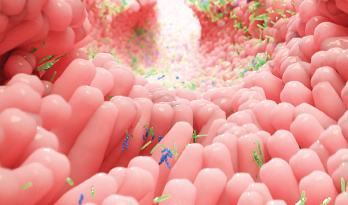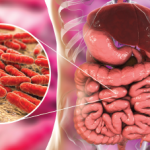
Alpha Tauri 3D Graphics / shutterstock.com
A growing body of research is elucidating the role of intestinal microbiota in several autoimmune diseases, including rheumatoid arthritis (RA). Research published in December 2018 Arthritis & Rheumatology increases our understanding of the “extent and nature of mucosal immune activation during preclinical arthritis.”1
The research objective, according to the report, was to “dissect intestinal mucosal immune responses in the preclinical phase of arthritis and determine whether the presence of Th17 cells, beyond involvement of the cytokine interleukin-17 (IL-17), is required for arthritis development and whether the involvement of Th17 cells in arthritis depends on the composition of the host microbiota.”
The research, using murine models of inflammatory arthritis, suggests that activation of mucosal immunity precedes the development of arthritis and that Th17 cells have a microbiota-dependent role in arthritis. These models (collagen-induced arthritis and antigen-induced arthritis) involve injections into the skin and/or joints, without direct exposure of the gut to antigen.
One of the researchers, Marije I. Koenders, PhD, assistant professor of experimental rheumatology at Radboud University Medical Center, Nijmegen, The Netherlands, explains the findings “demonstrate initiation of mucosal Th1 and Th17 cell responses and marked production of tumor necrosis factor α [TNFα], granulocyte-macrophage colony-stimulating factor [GM-CSF], and IL-22 by mucosal CD4+ T cells just before the clinical onset of arthritis.
“This suggests that activation of intestinal mucosal T cells during the immune-priming phase of RA may contribute to early, preclinical processes,” she says.
Although no direct application exists for this murine model-based research in clinical practice at this time, Dr. Koenders says microbiome-guided stratification of patients with inflammatory arthritis may improve therapeutic efficacy in the future.
“A microbiota that drives a string Th17 profile in arthritis patients may be a good indication for, for example, anti-IL-17 treatment or RORɣT blocking, whereas other microbiota may suggest a less important role for the Th17 pathway in disease,” she says.
“Currently, we are expanding our research in a model closer to the clinical situation. We are creating a humanized mouse model with human (patient-derived) microbiota in our mice to study the role of the microbiome in a highly translational setting to gain more insight into the mucosal cytokine responses and immunological consequences during arthritis development, especially in patients with new-onset RA.”
Role of the Microbiome
Research has found the composition of intestinal microbiota is altered in patients with RA. Patients with recent onset RA in North America have been found to have an increased amount of Prevotella copri and a reduced amount of Bacteroides in the gut.2
Subgroups of patients with RA have differential immunoglobulin G (IgG) or IgA immune reactivity with P. copri. A recent study found that about half of patients with RA have T cell responses to P. copri, responses that were either IgA antibody responses to P. copri, suggesting a mucosal immune response, or IgG antibodies to the organism, suggesting a systemic immune response.3
Mucosal surfaces—periodontal, lung, and intestinal tissues—are the proposed site of immune activation and breach of tolerance in RA, according to recent research, but the extent and nature of the mucosal immune activation during preclinical arthritis have been unclear.4


